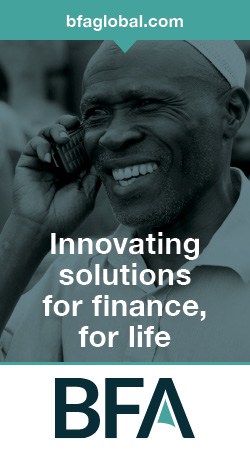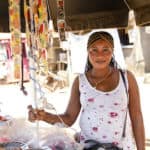Super Platforms in Africa: Not if, but When
Editor’s note: This post was originally published on the CGAP blog and is republished with permission.
It is 2030, and we walk into a bustling salon in a peri-urban area in Abuja. We see eight clients and a couple of TVs installed in the corners, and we can hear music playing. We meet the owner behind the reception counter: Anna. Anna is a hairdresser who moved to Abuja 15 years ago in search of new opportunities. She started off small but was savvy enough right away to use the e-commerce platform Jumia on her smartphone to order hair supplies, rather than travel to the store, freeing up time for her to work. She managed her marketing through Facebook and WhatsApp, and was one of the first hairdressers in town to accept mobile money.
 Today, Anna uses Alibaba and its affiliate Ant Financial daily. She uses mobile payments to buy input supplies and household items, and most of her clients use Alipay for her services. Anna still uses Facebook to offer discounts, and she keeps a local Adclick presence on Google. She’s taken on several microloans through Ant Financial’s channels, and this has helped her business grow rapidly. She’s started to explore the wealth management options she found easily on Ant’s Nigerian Wealth marketplace.
Today, Anna uses Alibaba and its affiliate Ant Financial daily. She uses mobile payments to buy input supplies and household items, and most of her clients use Alipay for her services. Anna still uses Facebook to offer discounts, and she keeps a local Adclick presence on Google. She’s taken on several microloans through Ant Financial’s channels, and this has helped her business grow rapidly. She’s started to explore the wealth management options she found easily on Ant’s Nigerian Wealth marketplace.
When Ant Financial entered Nigeria in 2022, it assembled social credit scores for people like Anna who had never been part of the formal financial system. This opened the door to new credit and financial services offerings that allowed Anna to open her salon. The future scenario we paint here for Anna is a positive one: The entry of super platforms accelerates the process of digitization, enabling her to establish a generative relationship with super platforms where they’re able to purchase inputs but also offer their services.
Stories like Anna’s may sound slightly far-fetched given the diffused, limited digital ecosystems of today, especially in Africa’s rural areas. However, many of the technologies that power the emergence of the digital world are available today in Africa and are already touching the lives of low-income people to some extent. Today, APIs seamlessly connect software across ecosystems, although they are not yet widely available from banks. Thousands of solar panels are connected to the internet (internet of things) and are able to collect data on weather patterns and household energy use. This, in turn, enables an assessment of each household’s electronic devices. Artificial intelligence is already present in Facebook’s news feeds, for example. Today’s low-level equilibrium, however, doesn’t allow Africans to have consistent connections or networks to properly plug in their businesses. Offerings are ad hoc, and the lack of network effects means that not everyone is hooked into a system — so not everyone will want to use mobile money. This makes systems less efficient and people less likely to use technology.
Yet Africans want to participate in these expanding digital ecosystems, and this desire will likely incentivize the adoption and use of digital financial services on a level beyond that which is expected today. As the digital ecosystems spawned and orchestrated by super platforms expand and provide increased value propositions to users, it will be only a matter of time before even low-income clients in Africa and elsewhere are drawn in as users of more than one platform. The two-way relationship that super platforms provide may open new income sources even for low-income people as they offer and sell local goods or services online.
As we mentioned in another blog, the Chinese giants are already looking to grow abroad. The founder of Alibaba, Jack Ma, has lofty goals for his company’s expansion, and Ant Financial is looking to grow its global foothold (as evidenced by its failed attempt to buy Moneygram). These early moves are signs of the incoming tide on Africa’s shore. Super platforms will continue to compete globally, but Africa will likely become a battleground for financial services, specifically because there are fewer strong incumbent banks or payment systems that can match the financial muscle or “data chops” of the arriving super platforms. Moreover, connectivity is expanding rapidly. Twenty-four of the 60 countries where Facebook Free Basics currently offers access to a limited version of the internet are in Africa. And thanks to successful mobile money rollouts in East Africa, many Africans are now ready and able to make digital payments from their cell phones. By 2020, more than half of cell subscribers on the continent will be using smartphones, up from a third today, enabling smartphone-based apps, an important element of Chinese super platform services.
Super platform entry into Africa is inevitable, and there will be repercussions for financial services providers, regulators and customers. There’s a huge opportunity for providers to work with local FinTechs and businesses and to expand and create positive two-way relationships with small and medium enterprises. In China, for example, dog groomers are able to offer services online, and people are making money with odd jobs because of the access these e-commerce and social platforms offer. Why wouldn’t this be the case in Africa?
Super platforms don’t offer financial services as the essential entry product but rather as an enabler for other desirable things — often as a corollary to some income-generating activity such as selling goods or labor through their platforms. Of course, these engagements generate a data record that may help make users worthy of traditional credit, or they may need another service like “bite-sized” insurance. In addition, super platforms already have extensive social networks that enable digital liquidity farming by tapping networks of friends and family to meet cash-flow crunches. As such, super platforms may be able to deliver financial inclusion at warp speeds in a way that traditional financial providers have not been able to.
For more depth on this topic, see Inclusive Digital Ecosystems of the Future.
Yanina Seltzer is a senior associate with the Insights & Influence team at BFA, a NextBillion partner.
- Categories
- Finance, Investing, Technology



